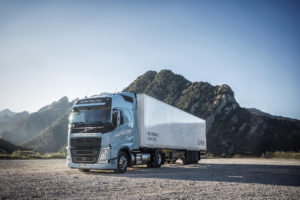Volvo Trucks is to launch liquefied natural gas versions of its FH and FM heavy duty trucks in the Spring of next year. The company is also working with gas suppliers and customers to expand the LNG infrastructure in Europe.
 It says the trucks, which will come with either 20 or 460 hp engines, will have CO2 emissions between 20 per cent lower than diesel if LNG is used or 100 per cent lower than diesel if bio-LNG is used.
It says the trucks, which will come with either 20 or 460 hp engines, will have CO2 emissions between 20 per cent lower than diesel if LNG is used or 100 per cent lower than diesel if bio-LNG is used.
Instead of an Otto cycle engine, which is commonly used for gas-powered vehicles, the Volvo FH LNG and Volvo FM LNG are powered by gas engines use diesel cycle technology.
The 460 hp gas engine delivers maximum torque of 2300 Nm while the 420 hp version produces 2100 Nm. Fuel consumption is on a par with Volvo’s diesel engines, but 15 to 25 per cent lower than for conventional gas engines.
The new trucks have the same performance, driveability and fuel consumption as Volvo’s diesel-powered models. Furthermore, the new trucks’ CO₂ emissions are 20–100 per cent lower compared with diesel, depending on choice of fuel. The new Volvo FH LNG and Volvo FM LNG are available with 420 or 460 hp for heavy regional and long-haul operations.
The gas powered trucks still need a small amount of diesel to be added at the moment of injection into the engine to ignite the gas. A 100 per cent reduction of CO2 emissions requires that fossil diesel is replaced with hydrogenated vegetable oils and combined with bio-LNG.
“Natural gas offers clear climate upsides, it is competitively priced in many countries, and there are sufficient reserves to justify large-scale use,” said Lars Mårtensson, director environment and innovation.






